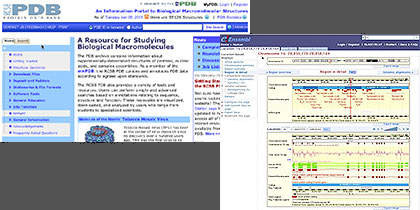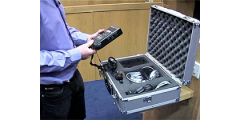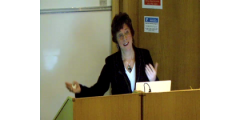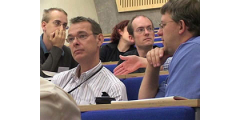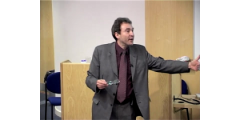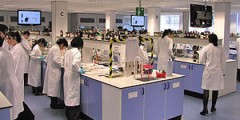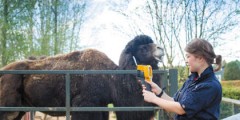Video overviews of specialist software for students new to biological databases
May 30, 2009
Sally Chappell, Paddy Tighe: “One of the modules I convene on the MSc in Immunology and Allergy is a bio-informatics module where we want the students to get familiar with a lot of online resources. We use a lot of software that’s really quite complex, so anything that we can do to remind them of …
Making a podcast of a lecture: recording and uploading to WebCT
May 27, 2009
Video >> Andrew: “This is the podcasting kit we use in lectures. It’s pretty bulky. This is what I just picked up from the learning and teaching resource and support people. This is the main kit and these are just the wires to plug it in, which I’ll do. “So that’s plugged in and on. …
Brenda Smith on assessment and feedback
May 20, 2009
Video >> Brenda Smith: “In terms of the aims for the session, I really have three, and that’s to emphasise assessment for learning rather than of learning. “The second aim is really to engage the active engagement of students in the whole process of assessment and feedback, and that’s from the sort of the very …
Video demonstrations of common laboratory techniques address student diversity and limited lab time
May 1, 2009
Sally Chappell and Paddy Tighe: “When people start the MSc in Molecular Diagnostics they come with quite varied levels of experience. Some of our students have been working in industry or a related area for maybe a year or two years, so they’re quite comfortable with lab techniques, whilst others come straight from a degree …
Gina Wisker on supervising students
April 13, 2009
Video >> Gina Wisker: “I think about supervision as a form of teaching and teaching doesn’t mean thrusting things down people’s throats, it means bringing things out of people. Helping them develop. Enabling. And research at any level is, undergraduate, postgraduate, work based or whatever, it’s a form of learning, so when I’m supervising students …
Chris Rust on assessment and feedback
April 11, 2009
Video >> Chris Rust: “You don’t need to go to the literature and spend much time to find how important assessment is considered regarding learning and teaching in higher education. It probably took me five minutes to find these quotes, and there are many more saying the same thing. It is at the centre of …
Effective demonstration of bench practical skills to large laboratory classes using an integrated system of visualisers, screens and SMARTboard
March 1, 2009
Colin Melia: “In these labs, we teach our students how to make different types of medicines including liquid medicines, creams, ointments, powders and suppositories. The students learn skills that they’ll have to use when they work in a hospital pharmacy manufacturing unit, a ‘specials’ medicines lab or anywhere where individual medicines have to be made …
Developing subject specific internet training sessions
January 31, 2009
Christian Haase: “In recent years, the Higher Education Academy, JISC, the University of Nottingham and other bodies have introduced new training sessions to encourage a more reflective use of the web. A number of studies suggest that such learning modules will reduce “copy and paste” plagiarism. However, it is questionable to what extent the new …
Objective Structured Clinical Examinations OSCE – reasonable adjustments for students with disabilities within the Division of Nursing
January 29, 2009
Sally-Ann Bradley, Lorraine Roberts and Nicki Walsh: Background and significance: “Since the Special Educational Needs and Disability Act (2001) was added as an amendment to the Disability Discrimination Act (1995), it has been unlawful for any educational institution to treat a disabled person ‘less favourably’ for a reason related to their disability. Educational institutions are …
Linking theory to practice in an undergraduate veterinary curriculum using case-based teaching: students’ perspectives
September 9, 2008
Hany Elsheikha: Background: “Case-based teaching (CBT) has been used extensively in medical and dental educational programs to develop critical thinking skills via a learner-centred approach. At the School of Veterinary Medicine and Science, University of Nottingham CBT was introduced as an ancillary teaching intervention to integrate clinically relevant material into the basic science component of …

